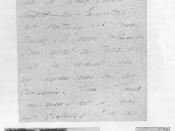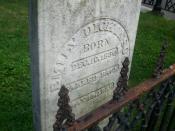Although Emily Dickinson is considered one of America's utmost poets, she was not regarded as a key force until the twentieth century when modern readers recognized Dickinson's work as groundbreaking and unprecedented by any of the time. Dickinson was not recognized in the nineteenth century because when she died at fifty-six years of age, only a few friends and relatives knew of the nearly two thousand, of which only 12 were published anonymously, poems that went unpublished. Dickinson did not base her writing style on writers who preceded her. However, her knowledge of the bible, classical myths, and Shakespeare aided Dickinson to create allusions and references in her poetry. She also transformed popular church hymns from standard rhythms to free-form hymn meters, a depiction of her inventive originality. Her originality has not always been understandable. Dickinson was noted as "the most paradoxical of poets: the very poet of paradox" (Johnson, 26).
On December 10, 1830 Emily Elizabeth Dickinson was born in Amherst Massachusetts. She was the second child of Edward and Emily Norcross Dickinson; Emily had an older brother William Austin Dickinson and a younger sister Lavinia Norcross Dickinson. Dickinson's Mother was not a significant presence in her life, as she appeared to have been rather emotionally inaccessible. However, her father headed the quiet, reserved household. Donoghue states Edward Dickinson "was a dedicated Whig, and a resolute defender of temperance. As a parent, he was somewhat harsh, or at best remote" (6). Because of her parent's religious background, Dickinson's parents raised her to be a good Christian woman who would one day have a family of her own. In fact, her father sheltered her from books he viewed as harmful to her mind and religious faith. However, Dickinson did not conform to the society in which she was raised.


